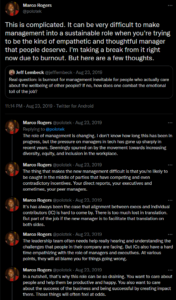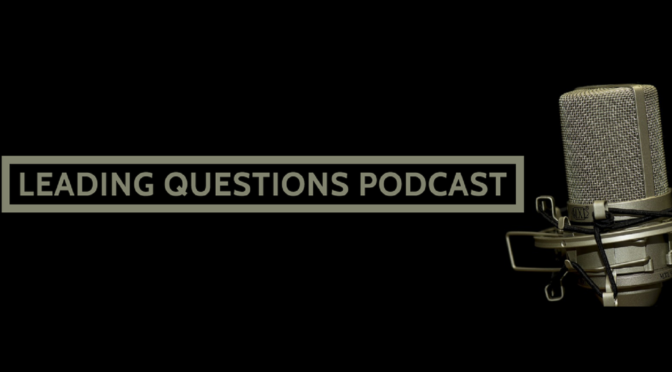Some months back I left my last employer and started a new gig, and as a result I am back at zero in trying to overcome my innate introversion for long enough to meet and integrate with a whole new team. It’s a lot. It also is an opportunity to reflect on the misunderstanding a lot of folks have about the nature of being an introvert.
Continue reading Outspoken Introverts and Shy ExtrovertsTag Archives: work
Leadership, Empathy, and Burnout

I first ran across this thread in early 2021 a couple of months into the COVID pandemic response (and all the stress that came along with that), and I doubt a week has gone in the year since that I haven’t thought about it. It lives in the top of my consciousness, and I highly suggest you give it a read before (or instead of) this post.
The question that kicked it off is an astute one: is burnout for management inevitable for people who actually care about the wellbeing of other people? I have thoughts.
Continue reading Leadership, Empathy, and Burnout
My Diminished Universe
As is true for most of you, I didn’t start 2020 with the intention of spending most of my waking hours in the same room in my home for months without end. My home office was, therefore, very much set up to accommodate my normal usage—playing video games, recording podcasts, and occasionally hobby coding—and to be “good enough” for the day or two each month I worked from home.
It did not take long to establish that what was sufficient for a few days a month was less than ideal for every day use. I believe my exact quote roughly a month in was “okay, this is about some bullshit right here.”
What followed has been an iterative process of tweaking my setup until it manages to satisfy my needs for work and for personal uses. All in, it’s taken about 8 months of calendar time, but that has amounted to probably one full day a month spent making significant changes to experiment with how things can be improved. I thought, then, I’d share with you!
Continue reading My Diminished UniverseBeing a Professional
For the past 20 minutes or so, I’ve been sitting at a table at a professional conference—an impostor in the natural habitat of the Business Professional. Continue reading Being a Professional
Observation
Several weeks ago, Dawn and I discussed several of the traits that are often found in strong leaders. Among them, there was one that is so overlooked that it is the first thing people ask me about my list: the power of observation.
Observation is key to so many aspects of leadership, but everybody that asks me about it meets it with a similarly dismissive attitude.
“Everyone knows how to look,” they deride, “it’s obvious.”
Observation is more than merely looking, it’s looking with intent! Being properly observant requires actively paying attention to your surroundings (and yourself) with the goal of taking action on the information that you find. it’s not merely being aware of the things around you, but earnestly absorbing them and processing what you find. It requires diving deeper than the surface; there are numerous levels of observation, and each layer deeper you manage to go is an additional degree of insight (and action) afforded you.
At its most basic, a leader should be in the habit of observing the general attitude of the team. How does the team seem when working? When not working? Interacting with you? When you’re not obviously around? With each individual member? With people outside of the team? When things are stressful?
The answers to questions like these paint a picture of the health of your team that you will never get by simply asking—the team might not even realize, for example, that they’re combative to “outsiders” but through careful observation you might note the signs. You might observe tension between teammates before it becomes notable to those involved, even.
Remember, though, that observation implies a willingness for action. When you observe behaviors that betray underlying “illness”, it is incumbent upon you to act. It’s the combination of careful observation and resulting action that will really elevate your ability to lead your team.
Acknowledging My Good Fortune
I say it frequently—but it bears repeating—I am so unbelievably lucky to have repeatedly found myself leading fantastic teams of hard-working people.
Consistently, these teams are willing to experiment and try new things; sometimes skeptically at first, but they always come around. They might worry about outcomes, but without fail they act from a willingness to take risks and see what happens.
Trust is a difficult thing in the workplace, and I’ve been profoundly fortunate to have always had teams that took those scary first steps to place their trust in me. They’ve given me room to work for them, and have given me room to fail and try again. That trust has consistently translated into being understanding when I fail or come up short, and a willingness to give me another chance to make good.
Because of all of these things and many more, my teams have reliably made me look good. That’s certainly not the point, but it is a nice side effect.
There’s no real point to this post…no lesson to be learned…just, be as lucky as I’ve been, I guess.
Pitch Perfect
Want to know if your team understands something? Ask them to give you the elevator pitch. If they can’t summarize the objectives and high-level milestones in a few quick sentences, it’s unlikely that they understand it very well.
Take a step back, can you give an elevator pitch? If not, take the time to make sure that you truly have a grasp on the plan, then take that newfound proficiency to get your team on board as well.
You’ll be surprised at how much traction simply having a firmer grasp on the subject will help your team gain!
Leading Questions (a Podcast)
A few weeks ago, Dawn and I were participating in a leadership conversation in a slack that we both frequent when the idea of us doing a leadership podcast was brought up.
Neither of us have ever waited to be asked twice to throw ourselves out there publicly, so we hastily pulled together a concept, some material, recording equipment, and set to work making a thing.
Yesterday, we posted the first episode of that thing!
Leading Without Ego
The lede of an interview in which I was recently featured ended up being the notion of not being precious with your ideas—as a result, that concept has been the topic of conversation quite a bit over the last few weeks. As often happens, the most common question to arise also happened to be the most obvious one:
How do you avoid being precious with your ideas?
Giving Voices to the Quiet
Susan Cain posits in her book “Quiet: The Power of Introverts in a World That Can’t Stop Talking” that there is no correlation between people who speak well and people who have the best ideas. In my experience that has been proven true repeatedly. The ideas of the more reserved members of the team are every bit as important as those from the more outspoken members.
Confessions of an IT Pro: Precious Ideas Will Hold You Back
This is a placeholder for an article about me that was posted on a different site. If you want to read the article, you’ll have to click through! Please try to ignore the ginormous picture of me at the top. Please try to ignore the use of the word “Pro” in the title. Creative liberties were taken!
Unlike being a lawyer or a doctor, IT has a number of entry points. Some go to school. Some convert their passion from childhood into a career. And some, like software professional Jer Lance, initially get their training and expertise through military service. We spoke with Lance about his roles spanning education, management and software development and what he’s learned over that time.
Q: How did you start your career? And how important do you think education and certifications were for you?
Slow Path to Leadership
I started a new job about a month ago, so I am right on schedule for my typical visit from the Imposter Syndrome fairy. It’s as regular as clockwork: suddenly immersed in a place where everyone in the building has infinitely more knowledge than I—everything from the business domain to work procedures to where to find the bloody conference rooms1—so I have to fight the feelings that I’ve finally taken on too much until I start to get my feet beneath me on something that feels like solid ground.2
It’s simultaneously exhilarating and exhausting.
You Get What You Measure
Wells Fargo has had to fire over 5,000 employees as it was found that they were making fake accounts on behalf of customers—these terminations took place over the course of a few years, so this has been going on for some time. More recently, however, the bank ended their program of incentives to cross-sell accounts to customers.
To recap: a company started to measure how often its employees were able to cross-sell accounts, applied incentives to that measure, and the employees dialed up their cross-sells to the point of actual fraud.
This is unsurprising, you get exactly what you measure—no more, no less.
I’ve seen this often in software delivery: companies claim to value quality, but what do they measure? Lines of code, features completed, project milestones, deadlines. What do you get in return for that measurement? You get tremendous amounts of low-quality work delivered on time and within budget—then you spend extraordinary amounts of time and money fixing all of the terrible, broken software you’ve created.
A past employer expressed tremendous amounts of frustration with exactly that problem when they brought me onto the team; their projects would be completed reliably on time or very close, but would often be delivered 100% or more late (and with tremendously reduced profit) because of the enormity of the repair tasks.
If you want to receive quality, that is what you have to measure. There are numerous ways to do so; incentivizing first-time delivery quality with zero-defect feature bonuses, tracking defect counts against feature complexity for a team, and turning off incentives for milestones in favor of incentives for active status communication are just a few that I have used with great success.
In the aforementioned company, I lobbied for and eventually succeeded in eliminating milestone measurement on the delivery side of the organization in favor of quality metrics similar to those above, and both profit and timeliness skyrocketed…but what rose the most was customer satisfaction. Suddenly, clients enjoyed our process and software, which was really my goal all along.
Remember that you will always get what you measure, but you will get the letter of it, not the spirit of it. Act accordingly.
Gig-quest 2016 Edition
I feel like there is scant discussion out there surrounding job searching mid-career. The Internet is full of helpful advice for early-career job seekers describing resume creation, job posting, searching job boards, and the like. What I don’t see very often is what to do when you’ve been in the field for a while; when you have built up a network of contacts, when you’re no longer looking for entry-level or near entry-level work, or when what you’re looking for is very narrow in terms of specificity or of job prospects.
This is probably not going to be that post either, but I would like to take some time to describe my job searching journey this summer.
Panic Managing
It’s quarter after nine in the morning and you’re just getting into the morning groove when it happens. In the very moment that you become aware of how eerily quiet and still the room has become your manager is standing next to you with a look you’ve come to know all too well–wide eyes, knuckles white around the handle of his coffee mug, flushed skin–his voice is just slightly higher pitched than normal as he starts to speak. He conveys to you today’s first emergency.
Just like that, your day is shot.
Managing Honesty
In a post several months ago, Seth Godin asks organizations that speak untruths to customers “what else will you lie about?”
The question of organizational integrity is one that I wrestle with frequently. I’ve written about it directly or indirectly several times already, and I’m sure I’ll write about it considerably more.
In the same way that Seth describes the slippery slope of institutional lying to its customers and to the public, managers must be wary of choosing to start glibly lying to his or her charges.
And it’s terribly easy to start lying.
You Get What You Pay For
One of the lessons that I find to be simultaneously essential to learn and incredibly difficult to teach is an idea that I refer to by the shorthand “being a consultant”–the notion of saving the customer from themselves.
Paul Sherman’s amazing presentation “The UX Unicorn is Dead” (if you haven’t read it, stop reading this and go read that) highlights an excellent opportunity to save the customer from themselves: customers asking to forgo UX or QA work (or, in some horrifying instances UX and QA work) in exchange for a lower price or faster timeline.
You get what you pay for.
Stepping Down
This post was originally going to be posted once the formal announcement of the change it describes was announced at work. Having been laid off mid-month, that announcement will never come, but I consider the concepts to be important enough to post anyway.
I resigned from my managerial role today.
Actually, it is more accurate to say that at the beginning of this month, I gave notice that I would be stepping down from my managerial role by month’s end. Today, that resignation simply became official. [Edit: Plus or minus a little…]
Leadership Doesn’t End
This post is a placeholder to an article that I wrote for another site, if you want to read the article, you’ll have to follow the link…
It’s 10am and I am sitting in my home office corresponding with a broad network of contacts and contacts of contacts, and it occurs to me that for a hopeless introvert, the last 24 hours amounts to more “being on” than I typically muster in even a busy week.And I haven’t even started trying to find a job for me yet!
Idle Hands Are a Good Thing, Right?
Today the majority of my team and I were let go from work. Laid off. Reduced. RIFed. Whatever the right term for that is. This being the third round of layoffs it isn’t entirely surprising anymore, although the degree of commitment represented by the depth of the cuts does take one back.















